- LanguageAfrikaans Argentina AzÉrbaycanca
á¥áá áá£áá Äesky Ãslenska
áá¶áá¶ááááá à¤à¥à¤à¤à¤£à¥ বাà¦à¦²à¦¾
தமிழ௠à²à²¨à³à²¨à²¡ ภาษาà¹à¸à¸¢
ä¸æ (ç¹é«) ä¸æ (é¦æ¸¯) Bahasa Indonesia
Brasil Brezhoneg CatalÃ
ç®ä½ä¸æ Dansk Deutsch
Dhivehi English English
English Español Esperanto
Estonian Finnish Français
Français Gaeilge Galego
Hrvatski Italiano Îλληνικά
íêµì´ LatvieÅ¡u Lëtzebuergesch
Lietuviu Magyar Malay
Nederlands Norwegian nynorsk Norwegian
Polski Português RomânÄ
Slovenšcina Slovensky Srpski
Svenska Türkçe Tiếng Viá»t
Ù¾Ø§Ø±Ø³Û æ¥æ¬èª ÐÑлгаÑÑки
ÐакедонÑки Ðонгол Ð ÑÑÑкий
СÑпÑки УкÑаÑнÑÑка ×¢×ר×ת
اÙعربÙØ© اÙعربÙØ©
Home / Albums / Tags wheelchairs + arrest
+ arrest 7
7
Post date

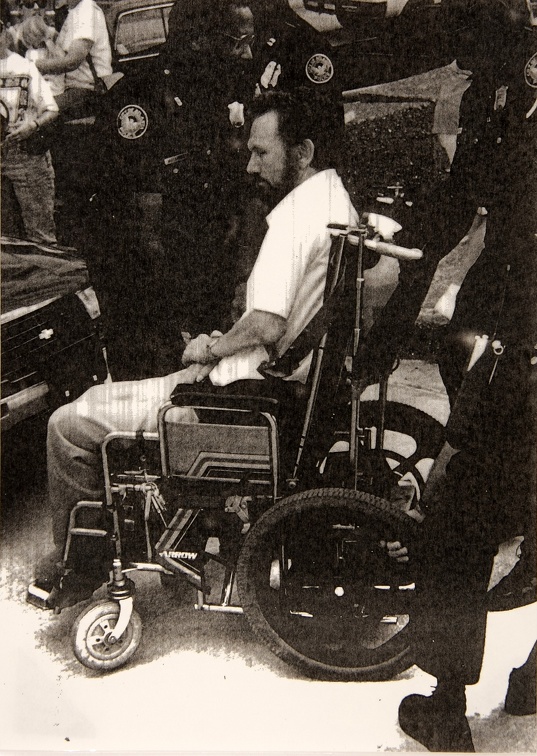 ADAPT (544)
ADAPT (544)
Photo by Tom Olin: A man (Dorian Smothers) in a motorized wheelchair sits with his hands in his lap, with a pensive look on his face as he looks down to his left. Two policemen hold onto his wheelchair and others stand behind them. Behind them several protesters stand between police cars.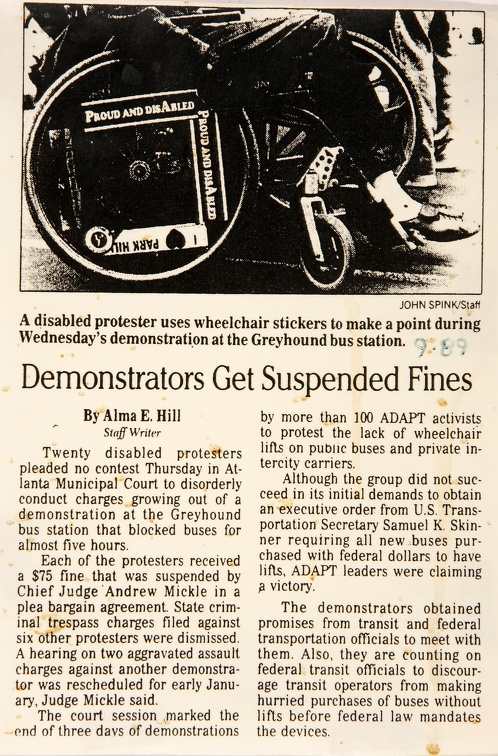 ADAPT (515)
ADAPT (515)
Photo (by John Spink/Staff): Close up of a manual sports wheelchair's wheels. Person in chair is only partially shown holding the push rim. On the spoke guard of the back wheel are 4 bumper stickers that form a square around the hub: 2 read Proud and disAbled, one partially obscured sticker reads I (heart) Park Mill and the 4th one is unreadable. A second manual wheelchair is just visible behind the first one and the legs of someone standing behind that second chair. Caption: A disabled protester uses wheelchair stickers to make a point during Wednesday’s demonstration at the Greyhound bus station. 9/98 [Headline] Demonstrators Get Suspended Fines by Alma E. Hill, Staff Writer Twenty disabled protesters pleaded no contest Thursday in Atlanta Municipal Court to disorderly conduct charges growing out of a demonstration at the Greyhound bus station that blocked buses for almost five hours. Each of the protesters received a $75 fine that was suspended by Chief Judge Andrew Mickle in a plea bargain agreement. State criminal trespass charges filed against six other protesters were dismissed. A hearing on two aggravated assault charges against another demonstrator was rescheduled for early January, Judge Mickle said. The court session marked the end of three days of demonstrations by more than 100 ADAPT activists to protest the lack of wheelchair lifts on public buses and private intercity carriers. Although the group did not succeed in its initial demands to obtain an executive order from U.S. Transportation Secretary Samuel K. Skinner requiring all new buses purchased with federal dollars to have lifts, ADAPT leaders were claiming a victory. The demonstrators obtained promises from transit and federal transportation officials to meet with them. Also, they are counting on federal transit officials to discourage transit operators from making hurried purchases of buses without lifts before federal law mandates the devices.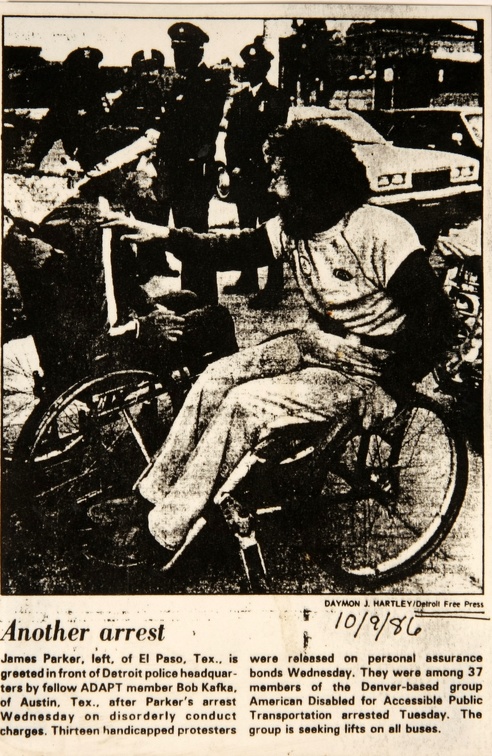 ADAPT (272)
ADAPT (272)
Detroit Free Press 10/9/86 PHOTO by Damon J. Hartley/Detroit Free Press: Two men in wheelchairs sit side by side but facing in opposite directions. One man, in a sports chair, who is dressed mostly in light colored clothes, has a bushy crop of dark hair and a mustache and beard (Bob Kafka). The other, in a more conventional manual chair without armrests, is dressed in dark clothes and has a headband and long hair and beard (Jim Parker). Bob has his inside arm up and his hand on Jim's shoulder. Behind them four uniformed police officers watch. Caption reads: Another Arrest James Parker, left, of El Paso, Tex., is greeted in front of Detroit police headquarters by fellow ADAPT member Bob Kafka, of Austin. Tex., after Parker’s arrest Wednesday on disorderly conduct charges. Thirteen handicapped protesters were released on personal assurance bonds Wednesday. They were among 37 members of the Denver-based group American Disabled for Accessible Public Transportation arrested Tuesday. The group is seeking lifts on all buses.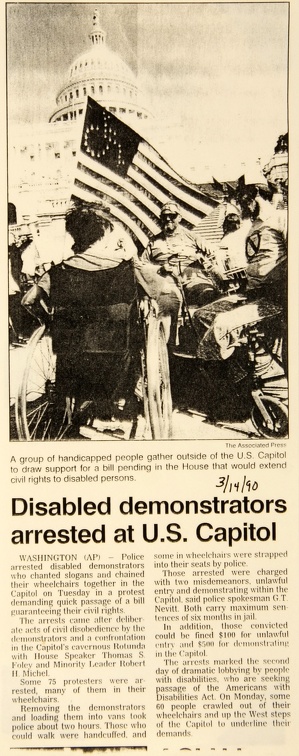 ADAPT (578)
ADAPT (578)
3/14/90 Disabled demonstrators arrested at U.S. Capitol WASHINGTON (AP) — Police arrested disabled demonstrators who chanted slogans and chained their wheelchairs together in the Capitol on Tuesday in a protest demanding quick passage of a bill guaranteeing their civil rights. The arrests came after deliberate arts of civil disobedience by the demonstrators and a confrontation in the Capitol's cavernous Rotunda with House Speaker Thomas S. Foley and Minority Leader Robert H. Michel. Some 75 protesters were arrested, many of them in their wheelchairs. Removing the demonstrators and loading them into vans look police about two hours. Those who could walk were handcuffed, and some in wheelchairs were strapped into their seats by police. Those arrested were charged with two misdemeanors, unlawful entry and demonstrating within the Capitol, said police spokesman GT Nevitt. Both carry maximum sentences of six months in jail. In addition, those convicted could be fined $100 for unlawful entry and $500 for demonstrating in the Capitol. The arrests marked the second day of dramatic lobbying by people with disabilities, who are seeking passage of the Americans with Disabilities Act. On Monday, some 60 people crawled out of their wheelchairs and up the West steps of the Capitol to underline their demands. PHOTO (The Associated Press): Three people in wheelchairs sit smiling at one another amid the crowd at the plaza at the bottom of the steps on the West front of the Capitol. Behind them the ADAPT flag flies, with it's wheelchair symbol made out of stars and the stripes like the American flag. Behind the flag is the dome of the Capitol against the sky. Caption: A group of handicapped people gather outside of the U.S. Capitol to draw support for a bill pending in the House that would extend civil rights to disabled persons.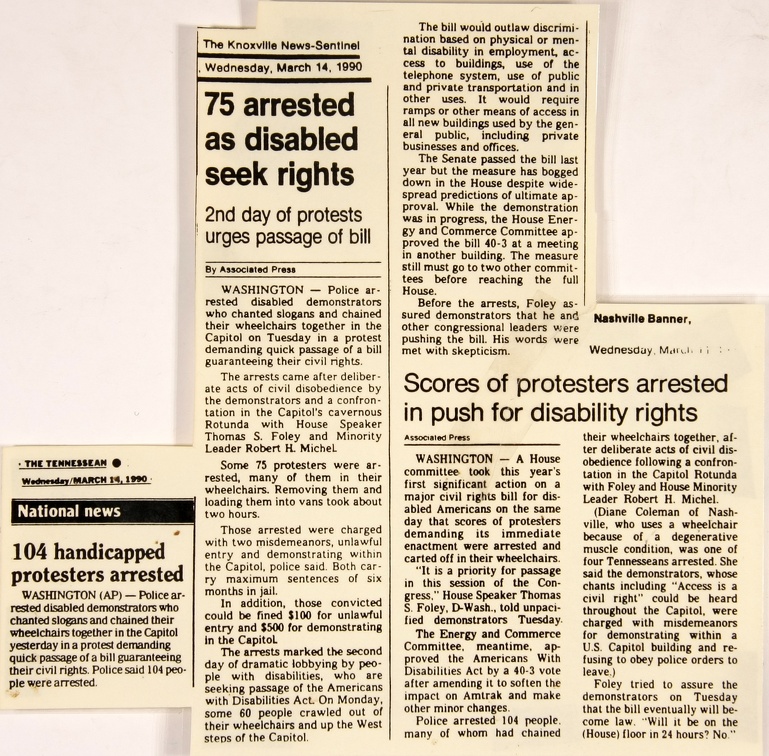 ADAPT (542)
ADAPT (542)
collection of articles from TN papers The Tennessean Wednesday, March 14, 1990 National news 104 handicapped protesters arrested WASHINGTON (AP) — Police arrested disabled demonstrators who chanted slogans and chained their wheelchairs together in the Capitol yesterday in a protest demanding quick passage of a bill guaranteeing their civil rights. Police said 104 people were arrested. The Knoxville News-Sentinel Wednesday, March 14. 1990 75 arrested as disabled seek rights 2nd day of protests urges passage of bill By Associated Press WASHINGTON -— Police arrested disabled demonstrators who chanted slogans and chained their wheelchairs together in the Capitol on Tuesday in a protest demanding quick passage of a bill guaranteeing their civil rights. The arrests came after deliberate acts of civil disobedience by the demonstrators and a confrontation in the Capitol's cavernous Rotunda with House Speaker Thomas S. Foley and Minority Leader Robert H. Michel. Some 75 protesters were arrested, many of them in their wheelchairs. Removing them and loading them into vans took about two hours. Those arrested were charged with two misdemeanors, unlawful entry and demonstrating within the Capitol, police said. Both carry maximum sentences of six months in jail. In addition, those convicted could be fined $100 for unlawful entry and $500 for demonstrating in the Capitol. The arrests marked the second day of dramatic lobbying by people with disabilities, who are seeking passage of the Americans with Disabilities Act. On Monday, some 60 people crawled out of their wheelchairs and up the West steps of the Capitol. The bill would outlaw discrimination based on physical or mental disability in employment, access to buildings, use of the telephone system, use of public and private transportation and in other uses. It would require ramps or other means of access in all new buildings used by the general public, including private businesses and offices. The Senate passed the bill last year but the measure has bogged down in the House despite widespread predictions of ultimate approval. While the demonstration was in progress. the House Energy and Commerce Committee approved the bill 40-3 at a meeting in another building. The measure still must go to two other committees before reaching the full House. Before the arrests, Foley assured demonstrators that he and other congressional leaders were pushing the bill. His words were met with skepticism. Nashville Banner, Wednesday March 14 1990 Scores of protesters arrested in push for disability rights Associated Press WASHINGTON — A House committee took this year‘s first significant action on a major civil rights bill for disabled Americans on the same day that scores of protesters demanding its immediate enactment were arrested and carted off in their wheelchairs. "It is a priority for passage in this session of the Congress." House Speaker Thomas S. Foley. D-Wash., told unpacified demonstrators Tuesday. The Energy and Commerce Committee, meantime, approved the Americans With Disabilities Act by a 40-3 vote after amending it to soften the impact on Amtrak and make other minor changes. Police arrested 104 people many of whom had chained their wheelchairs together, after deliberate acts of civil disobedience following a confrontation in the Capitol Rotunda with Foley and House Minority Leader Robert H. Michel. (Diane Coleman of Nashville, who uses a wheelchair because of a degenerative muscle condition, was one of four Tennesseans arrested. She said the demonstrators, whose chants including “Access is a civil right" could be heard throughout the Capitol, were charged with misdemeanors for demonstrating within a U.S. Capitol building and refusing to obey police orders to leave.) Foley tried to assure the demonstrators on Tuesday that the bill eventually will become law. "Will it be on the (House) floor in 24 hours? No "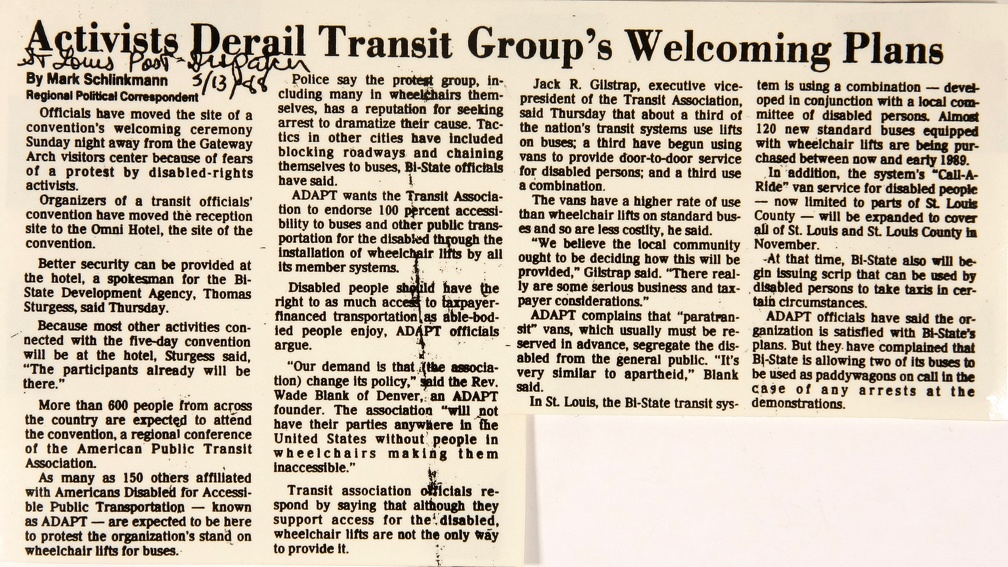 ADAPT (415)
ADAPT (415)
St. Louis Post Dispatch, 5/13/88 Activists Derail Transit Group’s Welcoming Plans By Mark Schlinkmann, Regional Political Correspondent Officials have moved the site of a convention's welcoming ceremony Sunday night away from the Gateway Arch visitors' center because of fears of a protest by disabled-rights activists. Organizers of a transit officials' convention have moved the reception site to the Omni Hotel, the site of the convention. Better security can be provided at the hotel, a spokesman for the Bi-State Development Agency, Thomas Sturgess, said Thursday. Because most other activities connected with the five-day convention will be at the hotel, Sturgess said, "The participants already will be there." More than 600 people from across the country are expected to attend the convention, a regional conference of the American Public Transit Association. As many as 150 others affiliated with Americans Disabled for Accessible Public Transportation — known as ADAPT — are expected to be here to protest the organization's stand on wheelchair lifts for buses. Police say the protest group, including many in wheelchairs themselves, has a reputation for seeking arrest to dramatize their cause. Tactics in other cities have included blocking roadways and chaining themselves to buses, Bi-State officials have said. ADAPT wants the Transit Association to endorse 100 percent accessibility to buses and other public transportation for the disabled through the installation of wheelchair lifts by all its member systems. Disabled people should have the right to as much access to taxpayer-financed transportation as able-bodied people enjoy, ADAPT officials argue. "Our demand is that the association change its policy," said the Rev. Wade Blank of Denver, an ADAPT founder. The association "will not have their parties anywhere in the United States without people in wheelchairs making them inaccessible." Transit association officials respond by saying that although they support access for the disabled, wheelchair lifts are not the only way to provide it. Jack R. Gilstrap, executive vice-president of the Transit Association, said Thursday that about a third of the nation's transit systems use lifts on buses; a third have begun using vans to provide door-to-door service for disabled persons; and a third use a combination. The vans have a higher rate of use than wheelchair lifts on standard buses and so are less costly, he said. "We believe the local community ought to be deciding how this will be provided," Gilstrap said. "There really are some serious business and tax-payer considerations." ADAPT complains that "paratransit vans, which usually must be reserved in advance, segregate the disabled from the general public. "It's very similar to apartheid," Blank said. In St Louis, the Bi-State transit system is using a combination — developed in conjunction with a local committee of disabled persons. Almost 120 new standard buses equipped with wheelchair lifts are being purchased between now and early 1989. In addition, the system's "Call-A-Ride" van service for disabled people — now limited to parts of St. Louis County — will be expanded to cover all of St. Louis and St. Louis County in November. At that time, Bi-State also will begin issuing scrip that can be used by disabled persons to take taxis in certain circumstances. ADAPT officials have said the organization is satisfied with Bi-State's plans. But they have complained that Bi-State is allowing two of its buses to be used as paddy-wagons on call in the case of any arrests at the demonstrations.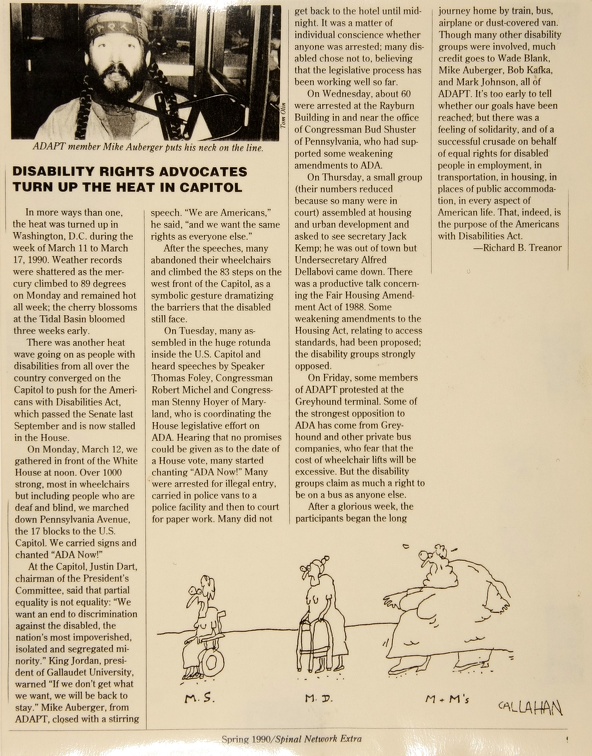 ADAPT (543)
ADAPT (543)
PHOTO by Tom Olin: Close up of Mike Auberger with mouth open chanting. Around his neck is a kryptonite lock locked to a second lock, which is locked to a revolving door. He wears and ADAPT bandanna around his head and long braids. Caption reads: ADAPT member Mike Auberger puts his neck on the line. DISABILITY RIGHTS ADVOCATES TURN UP THE HEAT IN CAPITOL In more ways than one, the heat was turned up in Washington, D.C. during the week of March 11 to March 17, 1990. Weather records were shattered as the mercury climbed to 89 degrees on Monday and remained hot all week; the cherry blossoms at the Tidal Basin bloomed three weeks early. There was another heat wave going on as people with disabilities from all over the country converged on the Capitol to push for the Americans with Disabilities Act, which passed the Senate last September and is now stalled in the House. On Monday, March l2, we gathered in front of the White House at noon. Over 1000 strong, most in wheelchairs but including people who are deaf and blind, we marched down Pennsylvania Avenue, the 17 blocks to the U.S. Capitol. We carried signs and chanted “ADA Now!" At the Capitol, Justin Dart, chairman of the President's Committee, said that partial equality is not equality: “We want an end to discrimination against the disabled, the nation's most impoverished, isolated and segregated minority." King Jordan, president of Gallaudet University, warned “If we don’t get what we want, we will be back to stay." Mike Auberger, from ADAPT, closed with a stirring speech. “We are Americans," he said, “and we want the same rights as everyone else." After the speeches, many abandoned their wheelchairs and climbed the 83 steps on the west front of the Capitol, as a symbolic gesture dramatizing the barriers that the disabled still face. On Tuesday, many assembled in the huge rotunda inside the U.S. Capitol and heard speeches by Speaker Thomas Foley, Congressman Robert Michel and Congressman Stenny Hoyer of Maryland, who is coordinating the House legislative effort on ADA. Hearing that no promises could be given as to the date of a House vote, many started chanting “ADA Now!" Many were arrested for illegal entry, carried in police vans to a police facility and then to court for paper work. Many did not get back to the hotel until midnight. It was a matter of individual conscience whether anyone was arrested; many chose not to, believing that the legislative process has been working well so far. On Wednesday. about 60 were arrested at the Rayburn Building in and near the office of Congressman Bud Shuster of Pennsylvania, who had supported some weakening amendments to ADA. On Thursday, a small group (their numbers reduced because so many were in court) assembled at housing and urban development and asked to see secretary Jack Kemp; he was out of town but Undersecretary Alfred Dellabovi came down. There was a productive talk concerning the Fair Housing Amendment Act of 1988. Some weakening amendments to the Housing Act, relating to access standards, had been proposed; the disability groups strongly opposed. On Friday, some members of ADAPT protested at the Greyhound terminal. Some of the strongest opposition to ADA has come from Greyhound and other private bus companies, who fear that the cost of wheelchair lifts will be excessive. But the disability groups claim as much a right to be on a bus as anyone else. After a glorious week, the participants began the long journey home by train, bus, airplane or dust-covered van. Though many other disability groups were involved, much credit goes to Wade Blank, Mike Auberger, Bob Kafka, and Mark Johnson, all of ADAPT. It‘s too early to tell whether our goals have been reached, but there was a feeling of solidarity. and of a successful crusade on behalf of equal rights for disabled people in employment, in transportation, in housing, in places of public accommodation, in every aspect of American life. That, indeed, is the purpose of the Americans with Disabilities Act. —Richard B. Treanor At the bottom of the page is a Callahan cartoon: Three women in a row. First woman is in a wheelchair and below her it says "M.S." Second woman is standing with a walker and below her it says "M.D." Third woman is very overweight and below her it says "M&Ms".